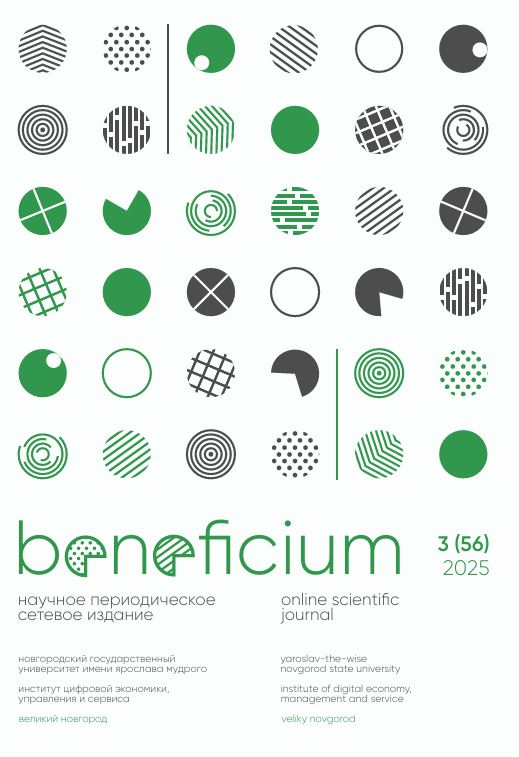METHOD FOR DETERMINING THE LEVEL OF SOCIAL DEVELOPMENT OF ORGANIZATION BASED ON THE EMPLOYEE SATISFACTION INDEX (ESI)
Abstract
The paper specifies the definition of social development system of enterprise’s personal (here and after referred to as PSDS) and proposes a systematic approach based on a set of elements and their directions. The authors emphasize three enlarged elements of the social environment of the organization in the PSDS: the personnel of the organization, social infrastructure and components of the quality of working life of the personnel. Each element includes several areas of work, which are assessed through a survey of employees to determine ESI, the reference value is 5, and it is proposed to use answer options containing qualitative formulations rather than quantitative assessments. The five-point scale will be used already in data processing. Consideration of employee’s opinions is a key aspect of the proposed method, i.e., subjective assessment of the perception of the social environment determines the success of the enterprise in this area of personnel management. Taking into account the opinions of employees is a key factor in the successful management of the PSDS, it is recommended to emphasize the key employees, depending on a sphere of the company's activity. The PSDS, is considered in a unified way without taking into account the specifics of certain activities, so the overall assessment of the level of social development is considered as the arithmetic mean of assessments of the elements of the system, the assessment of each element is determined as the arithmetic mean of assessments of its areas of development. The assumption is made that social development management is a universal subsystem of personnel management in any sphere of activity, thus the system of elements and their directions will be identical in each case, and this method will be useful to different organizations. The paper presents a fragment of approbation of the method at an energy enterprise adapted to its needs.
Keywords: personnel assessment method, social policy of the organization, social environment, personnel assessment, assessment of the level of social development
References
- Liptrap J.S. The Social Enterprise Company in Europe: Policy and Theory // Journal of Corporate Law Studies. 2020. Vol. 20(2). Pp. 495-539. DOI:1080/14735970.2020.1744409
- Bender B., Paster T. What types of social policies does business want? Examining German employer associations’ positions toward labor-protective and labor-activating social policies // Business and Politics. Vol. 25(4). Pp. 409-428. DOI: 10.1017/bap.2023.18
- Cheng Y., Policy Accumulation and Social Organization Development: Research Based on Social Organization Policies in China from 2004 to 2021 // Journal of Political Science Research. 2023. Vol. 4(4). DOI:23977/polsr.2023.040406
- Garasymliuk M., Datsiv O. Ways to Increase the Efficiency of Personnel Management of the Restaurant Enterprise // Herald of Khmelnytskyi National University. 2021. Vol. 298(5-1). Pp. 47-51. DOI: 10.31891/2307-5740-2021-298-5(1)-8
- Lehoczká L. Social Management as a Current Challenge for Management and Sustainability of Efficiency in Social Services // Journal of Social Science Research. Vol. 15. Pp. 110-114. DOI: 10.24297/jssr.v15i.8679
- Levkina V.N. Social Development of Personnel by Means of Implementation of the Innovative Training and Education Technologies // Vestnik of Lobachevsky State University of Nizhni Novgorod. Series: Social Sciences. 2020. Vol. 1(57). Pp. 109- (In Russ.).
- Kozhukhova J.E., Ovsyannikova S.I. Strategic Aspects of Social Development Management of Corporate Staff // Central Russian Journal of Social Sciences. 2021. Vol.16(3). Pp. 183-199. (In Russ.). DOI: 10.22394/2071-2367-2021-16-3-183-199
- Andreeva A.V. The Role of External and Internal Factors in the Transformation of the Social Development System of the Organization Staff // Vestnik Tverskogo gosudarstvennogo universiteta. Seriya: Ehkonomika i upravlenie. 2022. Vol. 2(58). Pp. 91-100. (In Russ.). DOI:26456/2219-1453/2022.2.091-100
- Bulanov V.A. Staff Development as a Manifestation of Responsibility in Social Oriented Management // Materials afanasian readings. 2023. Vol. S2(44). Pp. 92-94. (In Russ.).
- Suvalova T.V., Masyukova P.O. Current Tools for Managing Social Development of Large Companies’ Personnel. 2020. Vol. 4. Pp. 19-22. (In Russ.). DOI:26425/1816-4277-2020-4-19-22
- Zhukova M.A., Suvalov O.S. Nagement of Social Development of Organization in Russia // Management of the Personnel and Intellectual Resources in Russia. 2020. Vol. 9(1). (In Russ.). DOI: 10 12737/2305-7807-2020-27-31
- Rodyukova T.N. Upravlenie social'nym razvitiem lichnosti, personala, organizacii: obshchie i otlichitel'nye cherty [Management of social development of personality, personnel, organizations: common and distinctive features] // Innovative Science. 2020. Vol. 5. Pp.188-191. (In Russ.).
- Kuznecov A.L. Social'nye strategii predpriyatiya [Social strategies of enterprise]. Izhevsk: Publishing house of IzhGTU, 2000. 334 p. (In Russ.).
- Nejmer Y.L. Social'no-psikhologicheskij klimat kollektiva predpriyatiya [Socio-Psychological Climate of the Company’s Collective] // Sociological Studies. 1990. Pp. 81-88. (In Russ.).
- Zaripova N.S., Shestakova O.A., Khabarova Y.A. Assessment of the Social Development of the Organization's Personnel // Economics: Yesterday, Today and Tomorrow. 2019. Vol. 9(4-1). Pp. 343-349. (In Russ.).
- Vakhrusheva O.B., Khakhonova N.N. Assessment of the Effectiveness of Corporate Social Responsibility // Intellect. Innovations. Investments. 2022. Vol. 3. Pp. 20-27. (In Russ.). DOI: 10.25198/2077-7175-2022-3-20
- Pochebut L.G., Chiker V.A. Methodological Support for Social Capital Research in Organizations // Vestnik of the St. Petersburg University of the Ministry of Internal Affairs of Russia. 2024. Vol. 4(104). Pp. 325-335. (In). DOI: 10.35750/2071-8284-2024-4-325-335
- Global Indicator: Employee Engagement (2024). Gallup. URL: https://www.gallup.com/394373/indicator-employee-engagement.aspx (accessed on 25.05.2025).
- Why Happy Employees Are 12% More Productive (2015). Fast Company. URL: https://www.fastcompany.com/3048751/happy-employees-are-12-more-productive-at-work
About the Authors
Aleksey E. Parshukov – Cand. Sci. (Economics), Docent; Associate Professor, Peter the Great St. Petersburg Polytechnic University, Saint Petersburg, Russia. E-mail: flowprof@gmail.com. SPIN РИНЦ 5671-1694. ORCID 0000-0002-2010-1269. ResearcherID AAD-3744-2021. Scopus Author ID 57216910840
Alena A. Zemskova – Teacher of Additional Education, Children's Creative Center of the Krasnoselsky District of St. Petersburg, Saint Petersburg, Russia. E-mail: zemskowa.ale@yandex.ru. SPIN РИНЦ 4184-1908. ORCID 0009-0006-5092-8431
For citation: Parshukov A.E., Zemskova A.A. Method for Determining the Level of Social Development of Organization based on the Employee Satisfaction Index (ESI) // BENEFICIUM. 2025. Vol. 3(56). Pp. 39-48. (In Russ.). DOI: 10.34680/BENEFICIUM.2025.3(56).39-48









